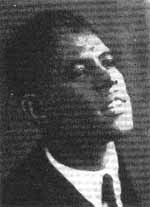Negro Folk Songs and Spirituals Part 1
 By James Weldon Johnson (Right, Roland Hayes)
By James Weldon Johnson (Right, Roland Hayes)
Click here for part 2 of this article
The Spirituals are purely and solely the creation of the American Negro. And their production, although seemingly miraculous, can be accounted for naturally. The negro brought with him from Africa his native musical talent-and that was no small endowment to begin with. In comparing the Spiritual with African folk songs, we note the significant fact that both are sung in harmony, and all other folk songs except those of Hungary, are expressed in unison. The Spiritual is sung by a leader and answered by a chorus, as in African folk songs. Generally speaking the European concept of music is melody, and the African concept is rhythm. In rhythm the African music is beyond comparison with any other music in the world. The syncopated rhythm of the African drumbeat is amazing in its wealth of detail - in its exchanges of rhythm. There is a dynamic quality and significance in its complicated rhythmic variations that baffle while they fascinate the Western mind. The African Negro had a share in one of the best known musical rhythms-that of the Habanera. This rhythm is best known as characteristic of Spanish music, but it is simply a combination of Spanish melody and African rhythm. This syncopated unit of African rhythm dominates all Spanish and Latin American music. A considerable portion of Bizet`s opera "Carmen" is based on it. The negro in America had his native musical endowment to begin with; and the Spirituals possess the fundamental characteristics of African music, but the Spirituals, rising above the base of the African rhythms, go a step in advance of African music through a higher development of harmony. What led to this advance by the American Negro beyond his primative music ? Why did he not revive and continue the beating out of complex rhythms on tomtoms and drums while he uttered barbaric and martial cries to their accompaniment ? It was because, at the precise and psychic moment, there was blown through or fused into the vestiges of his African music the spirit of Christianity, as he knew Christianity. At the psychic moment, there was at hand the precise religion for the condition in which he found himself thrust. Far from his native land and customs, despised by those among whom he lived, experiencing the pang of the separation of loved ones, knowing the hard lot of the slave, the Negro seized Christianity, the religion of compensations in the life to come for the ills suffered in the present existence, the religion that implied the hope that, in the next world, there would be a change in conditions, that he would be free from bondage. The result was a body of songs voicing all the cardinal virtues of Christianity-patience-forbearance-love-faith and hope-through a necessarily modified form of primative African music. The Negro took complete refuge in Christianity, and the Spirituals were literally forged of sorrow in the heat of religious fervor. Without the influence of Christianity there would have been no Negro Spirituals. It was by virtue of his simple Christian faith that the Negro created the Spirituals, and endowed them with a powerful and universal emotional appeal. It is not possible to estimate the sustaining influence that the story of the trials and tribulations of the Jews, as related in the Old Testament, exerted upon the Negro. This story at once caught and fired the imaginations of the negro bards, and they sang their hungry listeners into a firm faith that, as God saved Daniel in the lion`s den, so would He save them; as God delivered Israel out of bondage in Egypt, so would He deliver them. Thus it was by sheer spiritual forces that African chants were metamorphosed into the Spirituals; that, upon the fundamental throb of African rhythms, were reared those reaches of melody that rise above earth and soar into the miracle of the creation of the Spirituals. This article will be concluded in the next Document Newsletter. Article taken from The Mentor, February 1929.


